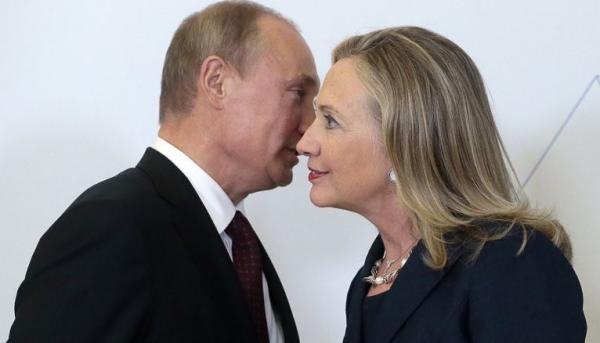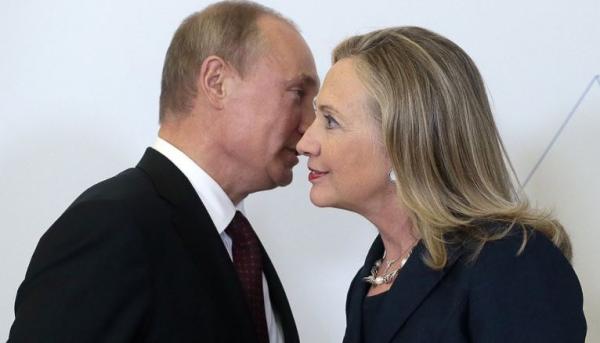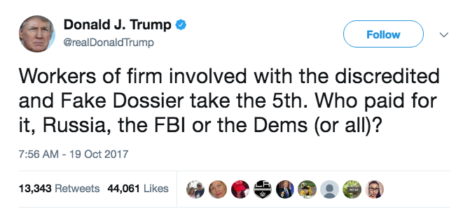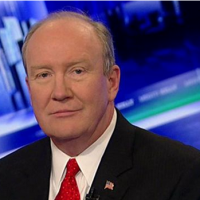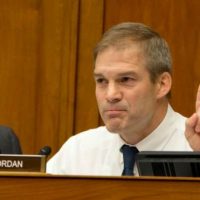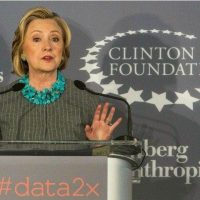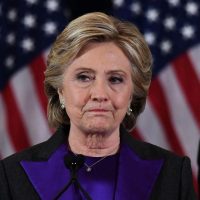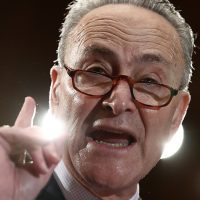There’s a lot of misinformation swirling about that shoddy dossier on Trump and Russia compiled by Christopher Steele. Here’s what’s actually been reported on the matter.
Last night the Washington Post reported that the infamous “Russia dossier” was partly funded by the Clinton campaign and the Democratic National Committee. The dossier’s inflammatory and unsubstantiated claims about Donald Trump provided the framework for mainstream media treatment of the president for much of the last year and fueled multiple investigations. Here are 10 things to keep in mind about the dossier.
1) Russian officials were sources of key claims in dossier
We’re in the midst of media frenzy over Russian disinformation campaigns, particularly as they apply to the 2016 election. It is worth noting that the sources of the “Russia-Trump dossier” were senior Russian officials:
Source A—to use the careful nomenclature of his dossier—was ‘a senior Russian Foreign Ministry figure.’ Source B was ‘a former top level intelligence officer still active in the Kremlin.’
2) No, the Russian dossier was not initially funded by Republicans
When the news broke that the Clinton campaign and the DNC were admitting partial responsibility for the Russia dossier, journalists acted like they’d presented it as a Clinton campaign operation all along. They also claimed it was initially funded by a Republican.
Incorrect. And Tapper took the tweet down when the error was pointed out. There is no evidence that a Republican donor or Republican campaign was ever involved with the Russian dossier. Fusion GPS claimed to reporters (though they did not provide evidence) that a Republican funded separate opposition research on Trump, dealing with his business interests. But as the Washington Post itself reports, the dossier did not exist until after the Democrats hired Fusion GPS:
Marc E. Elias, a lawyer representing the Clinton campaign and the DNC, retained Fusion GPS, a Washington firm, to conduct the research.
After that, Fusion GPS hired dossier author Christopher Steele, a former British intelligence officer with ties to the FBI and the U.S. intelligence community, according to those people, who spoke on the condition of anonymity.
3) The dossier is chock full of discredited information
Journalists who are friendly with Fusion GPS and opponents of the Trump administration claim, without any evidence of any kind beyond anonymous sources’ vague say-so, that the dossier has parts that were “verified.” That could mean something as simple as the parts about Russia trying to find information about Trump, or about Trump affiliates having friendly business relations with Russians. We have no evidence to suggest that anything significant from the dossier has been verified. And we don’t know how much, if any, was actually deliberate disinformation from the Russian government sources.
We have reports that the freelance spy who put together some of the information in the dossier was paying Russians for their information and used intermediaries. Former acting CIA director and Hillary Clinton campaign surrogate Michael Morrell said this was discrediting:
‘Then I asked myself, why did these guys provide this information, what was their motivation? And I subsequently learned that he paid them. That the intermediaries paid the sources and the intermediaries got the money from Chris. And that kind of worries me a little bit because if you’re paying somebody, particularly former [Russian Federal Security Service] officers, they are going to tell you truth and innuendo and rumor, and they’re going to call you up and say, ‘Hey, let’s have another meeting, I have more information for you,’ because they want to get paid some more,’ Morrell said.
Far from being “verified,” the dossier is better described as demonstrably false. That includes getting basic facts about Russia wrong, making claims — such as the claim that Trump lawyer Michael Cohen met with Federation Council foreign affairs head Konstantin Kosachev in Prague — that are verifiably wrong, making cartoonishly outlandish claims about finances, and various other problems.
4) The dossier was used as a basis for wiretaps on American citizens
In March, Washington Post used anonymous sources to report the FBI obtained a secret court order last summer to spy on U.S. citizen Carter Page, an unpaid and informal adviser to the Donald Trump campaign, as part of an investigation into links between Russia and the Trump campaign. CNN used anonymous sources to report that the infamous “golden showers” dossier was used as part of the justification to win approval to monitor the Trump associate.
A Clinton campaign opposition research operation using information or disinformation from top Russian intelligence officials was used by the FBI, these sources say, to enable spying on an opposing political party’s campaign.
5) The FBI also paid for the dossier
Last week, Donald Trump tweeted:
Fusion GPS was working on behalf of Russians while working on the dossier, but they claim, without providing evidence, that they kept their other Russia work separate from their Trump-Russia dossier work. Democrats released their involvement to friendly journalists at the Washington Post last night. When Trump asked about the FBI, many political journalists feigned shock and outrage that he would make such a claim.
They should not have. Their outlets had already reported that the FBI had tried to pay for the dossier and had, in fact, reimbursed expenses for the dossier. We do not know if those expenses include the payments to the Russian officials for salacious stories on Republican nominee for president Trump.
The FBI has resisted all oversight by congressional committees looking into the FBI’s role in funding and use of the dossier. Perhaps the agency is worried it will be revealed that a FISA court judge was misled about the provenance of the dossier. Perhaps the agency is worried about light shining on its use of the Clinton campaign operation to spy on Trump affiliates.
Speaker of the House Paul Ryan is backing House Intelligence Committee efforts to learn more about FBI’s handling of the dossier.
6) Dossier publisher Fusion GPS works with shady outfits
At a July hearing, Senate Judiciary members were told Fusion GPS helped advocate the interests of corrupt Russian and Venezuelan officials while hiding its foreign work from federal authorities.
Fusion GPS has been accused of illegally working as an undisclosed foreign agent and is currently refusing to comply with federal subpoenas for information on its foreign clients.
7) Fusion GPS’ ties to media are problematic
The principals at Fusion GPS are well-connected to mainstream media reporters. They are former journalists themselves, and know how to package stories and provide information to push narratives. They are, in fact, close friends with some of the top reporters who have covered the Russia-Trump collusion story.
Fusion GPS has placed stories with friendly reporters while fighting congressional investigators’ attempts to find out the group’s sources of funding. Fusion GPS leaders have taken the Fifth and fought subpoenas for information about the group’s involvement with Russia. Their close friendships with key reporters on these stories have paid huge dividends for the firm, although these friendships and cooperative relationships have not served the public well.
Fusion GPS was responsible for the dossier. But the group’s larger narrative push to reporters is even more influential, and a difficult story to unpack due to defensiveness, embarrassment, and outright media complicity.
8) Jim Comey personally briefed Trump on the dossier, shortly before CNN reported it
As confirmed by the Washington Post, the Russia-Trump collusion narrative was a Clinton campaign political operation. The dossier itself was shopped around by Fusion GPS a year ago to The New York Times, the Washington Post, Yahoo News, The New Yorker, and CNN, according to lawyers for the ex-spy who worked on the dossier. The dossier was so unverifiable that the only reporter to bite was from Mother Jones.
What really got the ball rolling on last year’s Russia-Trump conspiracy theory, then, was not the dossier itself but the briefing of it by Obama intelligence chiefs to President-elect Trump in January. Former FBI head Jim Comey admitted under oath that former Director of National Intelligence James Clapper asked him to personally brief President Trump about this dossier. The fact of that meeting was quickly leaked to CNN.
Given the dossier’s many problems, was the entire purpose of the meeting to produce the leak that the meeting happened? No one was biting on the dossier and it needed legitimization by opponents of Trump. If the dossier was so shoddy that it was debunked in hours after BuzzFeed posted it in all its salacious glory, why brief the president and president-elect on it, much less leak it? What was the real purpose of that meeting, and that leak to CNN?
9) Mueller investigation spurred by dossier and illegal leaks from intelligence operatives about Trump
We know from previous reporting that the dossier of Russia-supplied information or disinformation was used by the FBI to secure a warrant to spy on an American citizen advising an opposing political party’s presidential campaign. We know that this dossier was funded at least in part by the Clinton campaign, the Democratic National Committee, and the FBI. The firm that produced the report was itself funded by Russians.
We know that Comey briefed Trump on the dossier, and that this meeting was leaked almost immediately to CNN. We know that there were criminal leaks from intelligence officials regarding Trump associates having conversations with Russian counterparts.
We know that Trump was thrice told by Comey that he was not under investigation regarding Russia. And a year into the opposition-research-provoked Russia scare, we have no evidence of the Trump campaign committing treason by colluding with Russia.
Yet because of this dossier, and its selective use by intelligence agencies, we have a special prosecutor running a no-holds-barred investigation into Trump that, according to CNN, has gone into areas that have nothing to do with Russia or the 2016 election. We have two congressional investigations into alleged collusion of Trump and Russia. And we have had thousands of stories focused on supporting the Clinton campaign’s opposition research.
10) The Steele dossier was a Clinton/DNC-funded operation supported by the FBI and influenced heavily by Russian operatives in the Kremlin
The country has spent the last year with Obama intelligence officials, the media, and Democratic leaders pushing a narrative of Trump collusion with Russia to steal an election that was supposed to be won by Hillary Clinton. A meeting between Trump officials and a Russian who falsely promised dirt on Hillary Clinton is the best evidence — by far — to support this narrative.
Yet here we have the realization that the Clinton campaign, the DNC, and the FBI all worked wittingly or unwittingly with Russians to affect the results of the 2016 election. Far from just meeting with a Russian and not getting dirt on a political opponent, these groups wittingly or unwittingly paid Russian operatives for disinformation to harm Trump during the 2016 election and beyond.
Worse, these efforts perverted our justice system by forcing the attorney general to recuse himself for the crime of having served as a surrogate on the Trump campaign, spawning a massive, sprawling, limitless probe over Russia. These things are so much more damaging to the republic than a couple thousand dollars in ads on Facebook paid for by Russian trolls about a pipeline protest.
(First reported by the Federalist) http://thefederalist.com/2017/10/25/top-10-things-to-know-about-dossier/ (October 27, 2017)
Want more BFT? Leave us a voicemail on our page or follow us on Twitter @BFT_Podcast and Facebook @BluntForceTruthPodcast. We want to hear from you! There’s no better place to get the #BluntForceTruth.

